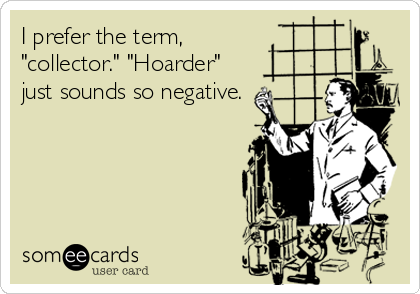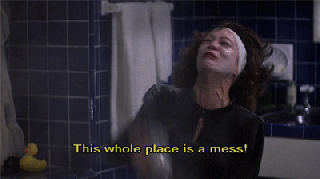Imagine shopping for clothes one day, when a beautiful green sweater catches your eye.
You take it home, beaming with happiness. You feel like you've been looking for this sweater all your life.
It makes you feel a sense of completeness; pride; even.
Then you put it in your closet with all your other clothes.
A few months pass, and the sense of completeness fades. You start itching to go shopping again. You go look for a new sweater.
You only ever wore the green sweater once.
Here's another one. Imagine buying a book that catches your fancy. You're relieved to snag a copy. You know the prints are limited and not everyone can get it. You feel very relieved that you are one of the chosen few. You put it on your shelf to read for later.. You smile at it every once in a while when you pass by your book shelf. You like how it looks like in your room. It feels very "you." But you struggle in finding time to read it. It spends so much time in your shelf that looking at it makes you feel a bit guilty now, and it dampens the feeling it once gave you.
When we buy things, getting the thing is just the first step to the experience of having it. For the item to fulfill you, it must be used according to the purpose it was made for.
The more we forget about the value of what's already there, the more we accumulate more of the same things. We start hoarding, uhm..."collecting" things that kind of just sit there, gathering dust.
Now stop thinking of the sweater and the book, and start thinking about advice you've gotten, read, stumbled upon, through the years. This kind of behaviour isn't strictly reserved to stuff we have in our rooms or houses. Beyond the physical realm, a lot of us have a habit of hoarding unused wisdom. In the sacred room that is our brain.
You receive it, and feel very enlightened to be someone who has this wisdom in their possession, but fail to use it. And so coming across this valuable piece of information becomes meaningless.
You receive it, and feel very enlightened to be someone who has this wisdom in their possession, but fail to use it. And so coming across this valuable piece of information becomes meaningless.
You know what I'm talking about right? There are figurative truckloads of overused quotes that you hear or read so much that they start to mean nothing. There are so many nuggets of wisdom that are quite universally familiar to the common person. And yet... Well, look at our world. Heck, just look at your Facebook feed.
Everyone knows they need to value their time more than they value money. Everyone knows that not all available knowledge is verifiable truth. Everyone knows how important empathy is. And yet... And yet.
The thing is, this is difficult for all of us. The second step after acquiring a good -which is actually using it- isn't always natural to us. And it's doubly hard to use advice and wisdom, because at least for our belongings, we are physically reminded that we have them, by their mere presence. It's far more difficult to do this to the contents of our brain and the behaviour that stems from it. Self-Awareness is the trickiest part of self-improvement.

Tricky because it's unlikely to be triggered to even really stop and think about it. There are no obvious signs that point to a lack of self-awareness in ourselves, even though it's easy to see it from other people. But if one feels that they've received so much good advice and yet their situation feels dis-aligned from what this wisdom was supposed to cure, it's pretty safe to say that they've probably been hoarding and not using.
I find this in my own life plenty of times. There are moments of clarity and peace, but every once in a while, because our lives naturally have ebbs and flows, I look at the state of my mind and my life and just go:
Then I'll have to gather myself, and try to focus on just a few nuggets of wisdom and really work on implementing them. Intently, whole-heartedly, self-criticisingly. It's always really messy and painful and humbling, but I always feel better, more together afterwards.
I'm currently undergoing a 90-day project after going to Arriane Serafico's workshop: I'm trying to create content regularly. And I have been struggling. In trying to come out of the rut, I find that using advice that I've known for a long time works just as well as looking for new inspiration. Especially if I've lost touch with the "old" advice. I just have to dust it off, and try it on again. It takes lots of practice and repetition before I feel like I've really learned and used a lesson and not just acquired it, and that first one is the secret to making the advice valuable at all.
It's easy to share a picture with a quote on it when it seems to make sense and is clever. But to be honest, a lot of the time, the people I see who do this very often, and with very varied (not ideologically-aligned) content, I've observed, seem to contradict themselves a lot, or seem to not really apply the wisdom to their lives, or worse, seem to have a habit of preaching, being offensive, or sub-posting (nagpaparinig in Filipino). While the people who do it less often seem to "curate" these pieces of wisdom and have them align with the way they live. They are not swayed by something just because it sounds clever, if they don't believe it. I think it might have to do with a person's relationship and openness to wisdom. Sometimes people like to skim the surface and be entertained or amused, or to criticise, and shame, while other times, they want to embody, teach, and share. Or maybe it has more to do with how careful a person is about what they impart to the world (some of those people I mentioned earlier post a lot of unverified "facts", too. haha.)
It is very easy to find faults in others, but hard to see them in yourself for the same reason that it's easier to make an inventory of what you own in your house VS what memories you have in your brain. We can see, hear, sense these faults around us, because we encounter these people and observe them. There are observable signals from outside ourselves that trigger our conclusions. The only way to observe ourselves is to make a point to do so. It rarely comes from the outside, and if it comes from other people, it's painful and will likely make us too defensive to make a real change.
So where do we start? First of all, when you see a quote that starts with "Some people..." Stop yourself from immediately thinking that you're not one of those people before you even read it. We always think we're on the right side of everything until we are proven wrong. It is very important to try to jump at any occasion to better oneself, before immediately thinking of someone else the advice must be useful to. Nobody wants to be that person who pushes their views, criticises and preaches to everyone but is unaware that everyone else thinks they don't follow their own advice. It also reminds people of advice they think you could use, if you get very critical and preachy to everyone else.
Second, think of the things that make you unhappy that you feel you have no control over. Then, think of the ways you can influence it. Accept that even though a lot of life is about luck, and social systems make it so that it's harder for some people than others, there's a way for you to make it at least a little bit better, and do that thing. This isn't to say that you shouldn't criticise the people that might be responsible, like, it's healthy to criticise some things, like the government, corporate greed, bad parenting or whatnot, but don't stop there and just give up. Do something from where you are. Every little bit helps. Everyone wishes someone else had done something, and yet they don't do much themselves.
Also, word to the wise: as much as you might think someone isn't criticising themselves, don't blatantly tell anyone that they never do. We don't fully know each other's inner journeys and if you happen to accuse someone of this who's actually undergoing a lot of self-criticism at the time, they might just stop trusting you. If you feel it is needed, maybe suggest it as a gentle nudge or ask it as a question. Don't assume!
Lastly, beyond understanding newly-acquired Golden Nuggets of Wisdom (or even old ones, because I'm sure you have a lot of gems in there that you haven't used to their full potential), try and find ways in which they apply to your own life, and think of specific behaviours you have that you could change accordingly. This part is very difficult for me, but I'm slowly learning to make my actions match my thoughts. The key is to keep trying, keep practicing, do it wrong, see what went wrong, change accordingly, fail better, keep applying again and again, keep learning, and to never give up. Or, to try again after every single time where you do give up, because ~even the best fall down sometimes~.
It's never too late! Let's all do this together!



No comments:
Post a Comment